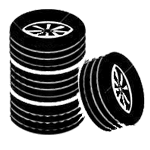What is a turbo timer?
Similar Questions:
Do I need to let the engine 'cool off' after driving?
Do I need to let the turbo 'cool off' after driving?
Will the turbo ever get hot enough to require a 'cool-down' period after driving?
A turbo timer is an electronic device which permits the car to run for a fixed length of time after the ignition has been shut off. It's sort of the reverse of a remote car starter, which runs the car before the ignition is switched on. Turbo timers usually have user-selectable run times and can usually be installed around car alarm systems.
The purpose of the timer is to allow the turbocharger additional cool-down time before the engine is shut down. The idea behind this came from the discovery that turbocharger systems can get hot enough to 'cook' the oil left in the turbo oil lines after the engine is shut off. The simple solution to this problem is to circulate oil for a longer period of time after the turbocharger has heated up. The turbo timer simply automates this process so the car operator is not forced to wait in his/her automobile until the desired cooling-down period has transpired.
Many DSM owners believe that turbo timers are a sound investment, or at least a prudent one, when weighed against the possibility of turbo damage due to oil lines partially or completely blocked with 'coke', or cooked oil residue. These timer proponents often point to the red-hot nature of the turbocharger after long runs at 55+ MPH as 'proof' that a turbo timer is a good idea. Other owners report they have run just as long and just as hard without a timer or any special attention provided to cool-down times, and still get turbo longevity and durability equal to those cars using a timer.
Driving patterns could also have a significant effect on the need for a timer. Folks who travel at high speeds almost directly to their destination will have higher turbocharger temperatures at shutdown than those who are required to wait at three or four stoplights or who drive through residential neighborhoods at low speeds before shutting down. Ambient temperatures and vehicle modifications are also likely to play a role.
There are several arguments against the necessity for turbo timers. There have been significant improvements in turbocharger design and oil formulation since the time turbo timers were concieved . This includes the advent of pure synthetic oils, which are more resistant to the turbo heat and free of impurities (such as waxes and varnishes) which contribute to coking problems. Turbochargers are also more precise and better lubricated than in previous designs. These facts are often cited as evidence for the case against turbo timers. The most compelling fact is that the majority of DSMers have never used a turbo timer, and yet there have been very few reports of DSMS 'coking' up the turbo oil lines with overcooked oil.
If you feel the need for a timer, many vendors sell them.
The Last Word: You do not need a turbo timer. But it can occasionally be handy.
QA #61
Last Updated:
2016-06-01 11:32







